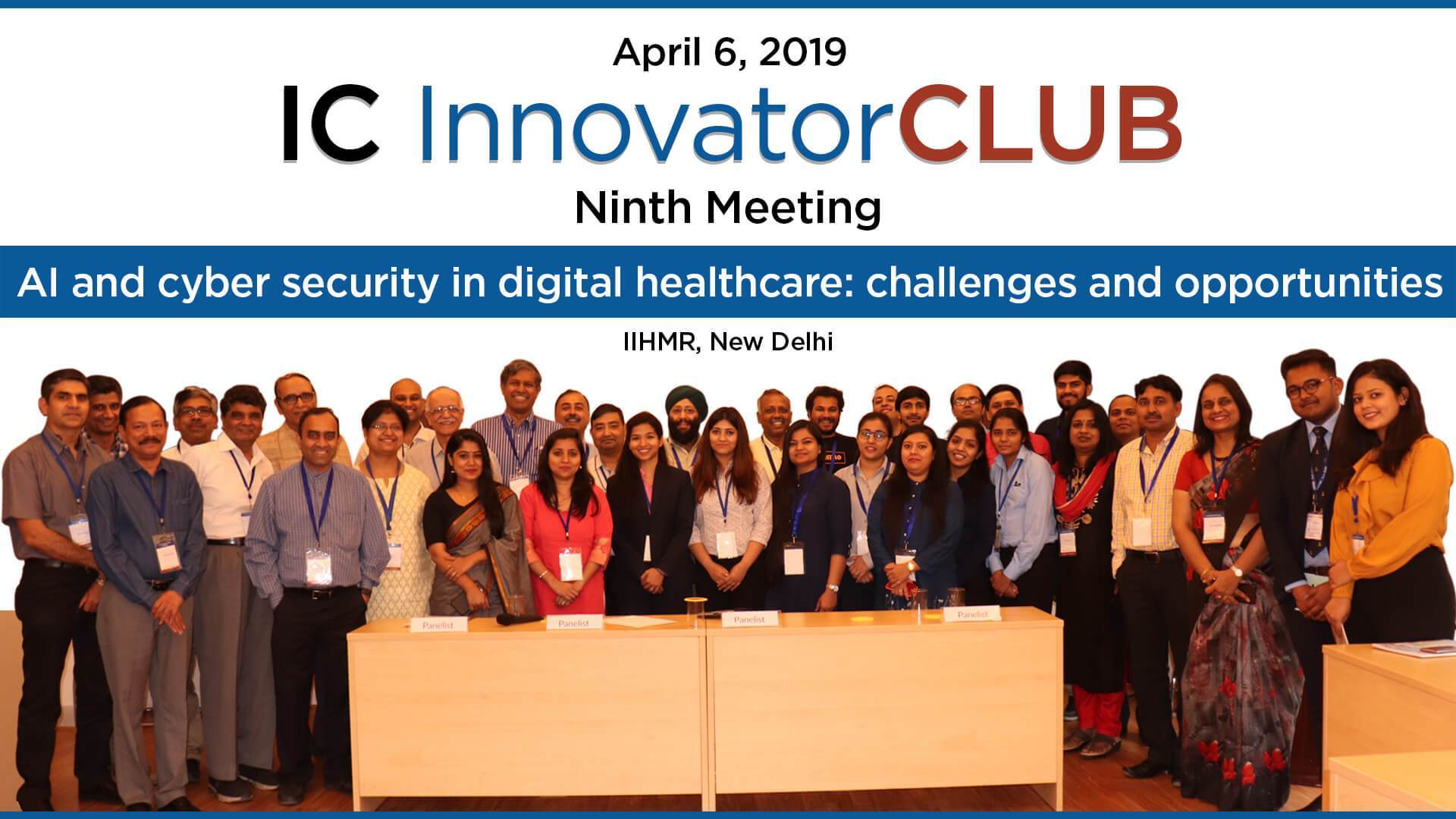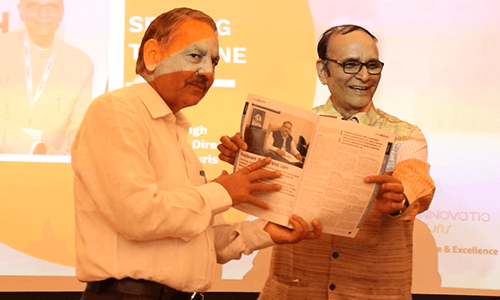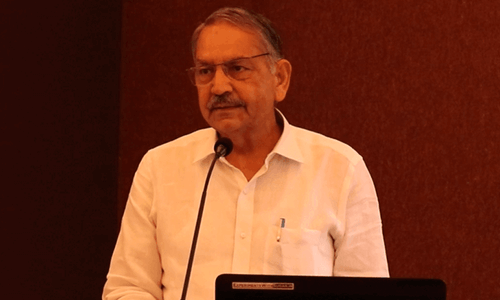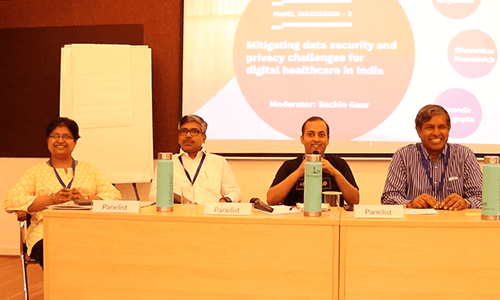All day all round we keep hearing the buzzwords such as Artificial Intelligence (AI), Machine Learning (ML), deep learning cybersecurity, etc. But do we really know what these are? Should we really be bothered and aware of how these can change the healthcare industry? To answer and brainstorm on such questions, the InnovatioCuris team gathered on a beautiful Saturday morning on 6 April 2019 in one of India & premier institutions in Hospital and Health Management, Indian Institute of Health Management Research (IIHMR), Delhi.

The meeting witnessed some very eminent and influential speakers from around the healthcare sector. The former Enforcement Director (ED) Karnal Singh who has investigated many high- profile cases graced the meeting as the Chief Guest.


Innovation is exciting and there are more innovations happening in the private sector, and with increasing technology come increased risks. With the rapidly growing technology, ranging from wireless devices such as mobile phones, tablets, and laptops to smart refrigerators, cars, and even medical devices like pacemakers, etc., it seems that the growing connections around us are difficult to detect. Therefore, the risk that comes together in operating within this brave, new and a connected world is high.
Shri Karnal Singh shared his expert viewpoint on the impact and importance of artificial intelligence, connected healthcare and need for cybersecurity in healthcare. How the digitization of healthcare is important and the rural and urban divide of same. He also insisted on the improvement of infrastructure and facilities available in the rural healthcare industry. In addition, he discussed the gap between the medical industry and government institutions where the research is needed and that we adopt mostly from our partnering and supporting foreign countries and how a change in mindset and adoption of new and improved technology can enhance the Indian healthcare. The future of healthcare is on the Internet and the Internet is vulnerable. Technology is the solution and it will come whether we want it or not. Therefore, the need of the hour is OUR PREPAREDNESS. We should welcome and be prepared for the connected network of healthcare.
An interesting session on the basic concepts of AI was the icing on the cake. It acquainted the participants with AI emphasizing on the fact that one should not get bogged down by the technology. Instead, one should focus on the use cases of it and there lies the innovation.

Often, the terms “digital health” evoke images of smartwatches or apps that can process the health data and can give a readout of parameters like heart rate, blood pressure, etc. That is a part of digital health, to be sure, but today we also focus on a newer aspect called “Precision Health” and the session “Prerequisite and journey of India to offer (precision) healthcare to all: Powered by Digital, Genetics, and AI” offered a far more expansive vision for digital health technologies, genetics and AI.
Precision medicine is an emerging approach of medicine which focuses on the cause of an illness, and not addressing the symptoms alone. Precision medicine may not be very well- known as Personalized Medicine. But they are the same. It takes into consideration individual variability in genes, environment, and lifestyle for each person.

Precision healthcare improves efficiency and accuracy to healthcare treatments. With precision healthcare, doctors can potentially develop targeted and precise treatment and therapies for masses as well as for an individual. This can improve patient treatment to large populations in countries like ours.
It’s based on evidence and data which comes from a series of medical tests on a patient. Thus, the data is its most important aspect. Very soon, along with genome sequencing and health sensors data coupled with the growing amount of Big Data, patient data will create large data sets of valuable information which can be used for more tailored treatments. But as an individual, a physician is not equipped to manually analyze these newly available data sets, which is where the advanced technologies such as AI come into picture.
The challenge that the clinicians see in the adoption of AI is the gap between the technical person and a clinician in regard to understanding the implementation of “normal reference values”. For example: If the normal value of hemoglobin for a person staying at planes (say Delhi NCR) is 13.5, the value 17.5 is perfectly normal at Ladakh. Is that incorporated in the AI system? Something that works in the USA might not work in India. The doctor or a clinician will have a great role to play in case of developing the AI as he/she can only give the correct inputs for the training sets.
With the new wave of digitization, medical records have seen a paradigm shift in the healthcare industry. As a result, the healthcare industry is witnessing an increase in the absolute volume of data in terms of complexity, diversity, and timeliness. Since the healthcare experts look for every possible way to lower the costs while improving the care process, delivery and management, and so is the aim of InnovatioCuris (IC), big data emerges as a persuasive solution with a promise to transform the healthcare industry. This paradigm shift from reactive to proactive healthcare may result in an overall reduction in healthcare costs and gradually may lead to economic growth. The above-stated and many more discussion points were there that became the part of the very interactive and interesting second session on “Mitigating data security and privacy challenges for digital healthcare in India”.
Data transmission is also an important aspect of implementing technology and safeguarding it. The Digital Information Security in Healthcare Act (DISHA) is one such step taken by the Indian Government in the long journey to securing the healthcare data of patients in India.
One of the biggest challenges is the lack of availability of data in a democratic manner and it’s all in silos in short data interoperability is a huge challenge. The major concerns that the clinicians have at the moment regarding the implementation of DISHA act are that it says that no court shall entertain any complaint unless made by the Central Government or central data authority, state data authority or the person affected and there would be times when PIL (public interest litigation) is there on the data security as well. The challenges will always pertain but what we need to do is to have trust in the law and protection by it. Major challenges regarding data security or cybersecurity, in hospitals or the clinical establishments, is that we do not have implemented laws that may protect our data. With the hope that they are definitely going to come, we can only stay prepared with our changed mindsets.

